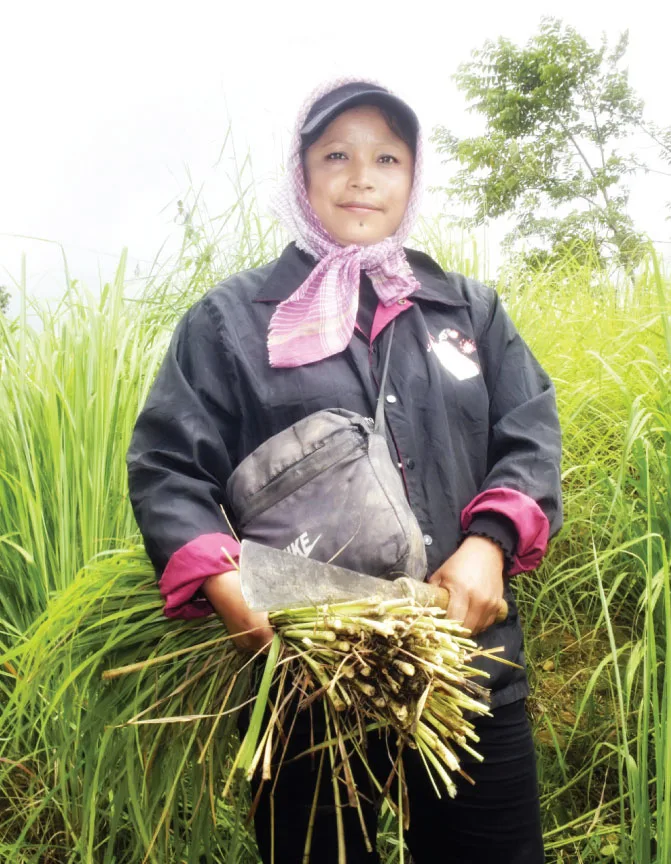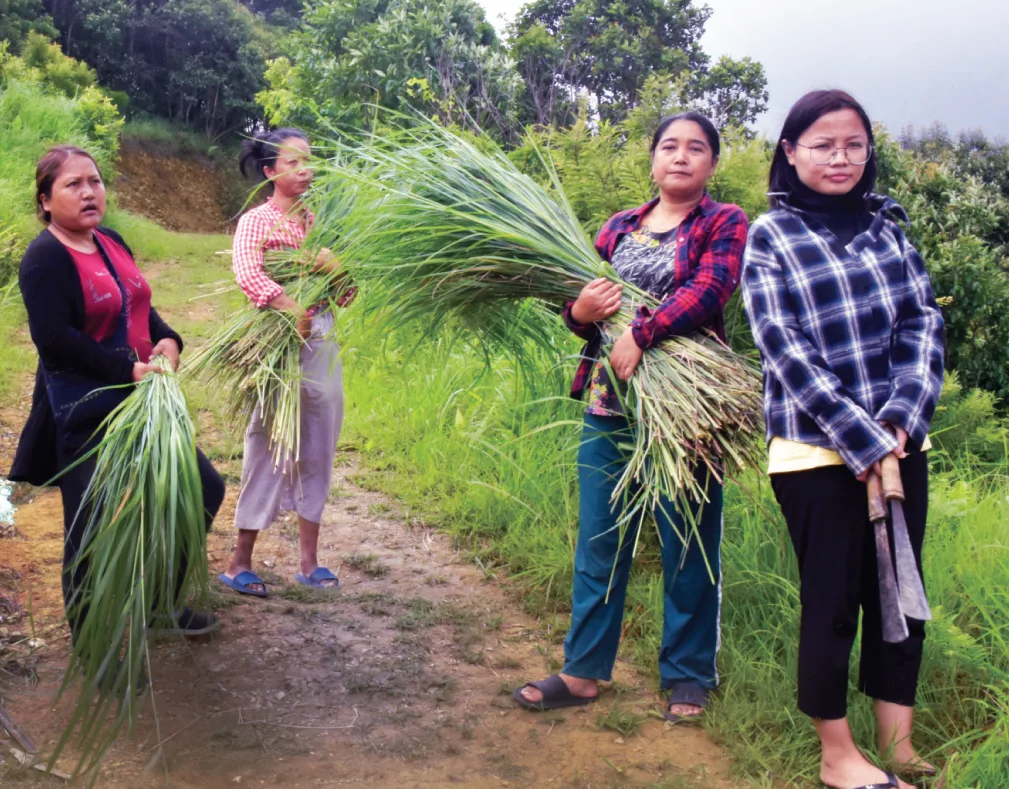
Leg up for liftoff
Locally available lemongrass has fuelled a thriving business for an enterprising group of women in Mizoram’s Serchhip district
The women of North Vanlaiphai village in Mizoram’s Serchhip district never realised that a revolution was underfoot — quite literally.
They knew all about the ubiquitous lemongrass plant growing all around their village and in other parts of the district, but never gave it much thought. They certainly didn’t know that it would one day change their farming fortunes.
Before the North Vanlaiphai Women’s Collective was set up in 2021, women farmers in this central Mizoram district were struggling to make a living. Land holdings here are fragmented, overrun by forests, perched on inaccessible hillsides, or simply uncultivable.
“Most villagers do not even own land. About 80% of them lease the land from the village council and grow crops on it,” says James Lalthansanga, programme officer with the Northeast Initiative Development Agency (NEIDA), a partner organisation of the Tata Trusts.
Then there is water scarcity. Water sources are typically a kilometre or more away from the village, and the hilly terrain makes it difficult to dig borewells or create irrigation systems closer by.
“Because of the small size of plots, we cannot imagine crop production on a large scale,” adds Mr Lalthansanga. “The women make candy, engage in some animal husbandry, but that is just a token contribution to the household income. So when this exciting thing presented itself, they were eager to take it up.”
Mr Lalthansanga is referring to the opportunity of making lemongrass tea from the wildly growing hnim (grass in Mizo). “It wasn’t until we at NEIDA visited North Vanlaiphai and saw the extensive growth of lemongrass that we realised there was a commercial opportunity right there, waiting to be plucked.”
The all-year-round cold weather of Serchhip, its high altitude and humidity make lemongrass — a hardy 1ft-tall plant that can survive winter snowfall and water scarcity — grow here in abundance.
NEIDA introduced the idea to the women of North Vanlaiphai and helped them set up the eponymous collective. At the moment, this is a somewhat informal group, an offshoot of the more structured East Lungdar farmer producer organisation (FPO), which has both men and women as members.
N Vanlaiphai, as the group is known, currently has 20 members making lemongrass tea from the easily available plant, after receiving technical support and guidance from NEIDA and the local Krishi Vigyan Kendra (the Kendras are extension centres that serve as a bridge between the Indian Council of Agricultural Research and farmers).
JH Lalkrosthangi, a secretary with the village council in North Vanlaiphai, had tried to make lemongrass tea on her own even before it was suggested by NEIDA. “I got together women from my neighbourhood to start working on this,” says the 41-year-old. “There was enough lemongrass growing in the village so that we did not need any seed capital, but we faced a lot of other problems.”

Market hurdles
One of the hurdles was market access. Ms Lalkrosthangi used to sell her tea locally and in Aizawl, Mizoram’s capital. It can take up to seven hours to cover the 170km from North Vanlaiphai to the city. Ms Lalkrosthangi would pack the tea into bags and send these once a month. Friends in Aizawl would collect the cargo and deliver it to a local wholesaler. It was a complicated and uncertain system, one that gave her no control over the price her tea was sold for.
NEIDA helped her and others in the Collective resolve such issues. A solar dryer, donated by the Selco Foundation, was provided to dry the lemongrass and scale up production. After some basic packaging, NEIDA buys the women’s produce and sends it to markets as far as Guwahati, in Assam, at no additional cost to the Collective.
Lalhriatpuii, also from North Vanlaiphai village, is grateful for NEIDA’s assistance. Once she joined the Collective, Ms Lalhriatpuii received training in hygienic processing, drying and packaging. She also has access to bigger markets in Mizoram and sells directly at fairs and exhibitions. Having branded her products, she’s now able to negotiate a better price for them. Ms Lalhriatpuii used to make ₹12,000-15,000 per year from small-scale sales. She now earns ₹60,000-75,000 from lemongrass tea alone, with additional income from her candy and passion fruit juice business, which brings her total yearly income to about ₹120,000.

Among the women working with Ms Lalkrosthangi is Ms Zohmingthangi, a 31-year-old mother of two who is new to the trade. “After joining the group, I learned how to clean, dry and pack lemongrass tea,” she says. “I find it inspiring to work with other women and share ideas. I’m slowly starting to earn a steady income and that makes me proud.”
Ms Zohmingthangi no longer has to depend only on her husband’s jhum farming; she has started to take care of major household expenses, including the children’s education. More significantly, her extended family now sees her as an entrepreneur doing something meaningful, not just a homemaker. “One day I hope to have a flourishing lemongrass tea business that I can run entirely from home,” she says.